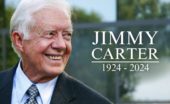Molly Minturn - My family is heartbroken to share that my father died in surgery on Monday, Feb. 10. It…
Angler: the Cheney vice presidency
Written by Diana Thebaud Nicholson // October 12, 2008 // Politics, U.S. // Comments Off on Angler: the Cheney vice presidency
The Shadow President
By JACOB HEILBRUNN
(NYT Book review) As governor of Texas, Bush hewed to a centrist course, working, as he often boasted, with the Democratic-led State Legislature. As a candidate for the presidency, he promised more of the same. But as president, he struck out on a more radical and polarizing course, one that Barton Gellman, in his engrossing and informative “Angler,” suggests he would not have followed absent Cheney. (Angler is Cheney’s Secret Service code name.) Gellman, a reporter at The Washington Post, has interviewed numerous associates and antagonists of the vice president, offering the most penetrating portrait of him yet. The result is that Cheney doesn’t seem as bad as you might think. He’s even worse.
Be afraid – very afraid – of Sarah Palin’s aspirations!

Pulitzer Prize-winning journalist Barton Gellman’s news-breaking investigative journalism documents how Vice President Dick Cheney redefined the role of the American vice presidency, assuming unprecedented responsibilities and making it a post of historic power.
Dick Cheney changed history, defining his times and shaping a White House as no vice president has before— yet concealing most of his work from public view. [The author] parts the curtains of secrecy to show how Cheney operated, why, and what he wrought.
Above all, Angler is a study of the inner workings of the Bush administration and the vice president’s central role as the administration’s canniest power player. Gellman exposes the mechanics of Cheney’s largely successful post-September 11 campaign to win unchecked power for the commander in chief, and reflects upon, and perhaps changes, the legacy that Cheney—and the Bush administration as a whole—will leave as they exit office.
16 September
How First Mate Shifted the Ship of State’s Course
(Books of the Times) In “Angler,” his forceful new study of Mr. Cheney’s tenure in office, the Washington Post reporter Barton Gellman writes that “the vice president shifted America’s course more than any terrorist could have done,” that while al Qaeda took a terrible toll on 9/11, “decisions made in the White House, in response, had incomparably greater impact on American interests and society.”
24 June 2007
(Washington Post) The Pulitzer Prize series
‘A Different Understanding With the President’
Over the past six years, Cheney has shaped his times as no vice president has before. This article begins a four-part series that explores his methods and impact, drawing on interviews with more than 200 men and women who worked for, with or in opposition to Cheney’s office. Many of those interviewed recounted events that have not been made public until now, sharing notes, e-mails, personal calendars and other records of their interaction with Cheney and his senior staff. The vice president declined to be interviewed.
“Angler,” as the Secret Service code-named him, has approached the levers of power obliquely, skirting orderly lines of debate he once enforced as chief of staff to President Gerald R. Ford. He has battled a bureaucracy he saw as hostile, using intimate knowledge of its terrain. He has empowered aides to fight above their rank, taking on roles reserved in other times for a White House counsel or national security adviser. And he has found a ready patron in George W. Bush for edge-of-the-envelope views on executive supremacy that previous presidents did not assert.
Pushing the Envelope on Presidential Power
The vice president’s unseen victories attest to traits that are often ascribed to him but are hard to demonstrate from the public record: thoroughgoing secrecy, persistence of focus, tactical flexibility in service of fixed aims and close knowledge of the power map of government. On critical decisions for more than six years, Cheney has often controlled the pivot points — tipping the outcome when he could, engineering stalemate when he could not and reopening debates that rivals thought were resolved.
A strong push from backstage
Cheney has changed history more than once, earning his reputation as the nation’s most powerful vice president. His impact has been on public display in the arenas of foreign policy and homeland security, and in a long-running battle to broaden presidential authority. But he has also been the unseen hand behind some of the president’s major domestic initiatives.
Cheney led a group that winnowed the president’s list of potential Supreme Court nominees. Cheney resolved a crisis in the space program after the Columbia shuttle disaster. Cheney fashioned a controversial truce between the legislative and executive branches — and averted resignations at the top of the Justice Department and the FBI — over the right of law enforcement authorities to investigate political corruption in Congress.
And it was Cheney who served as the guardian of conservative orthodoxy on budget and tax matters. He shaped and pushed through Bush’s tax cuts, blunting the influence of Federal Reserve Chairman Alan Greenspan, a longtime friend, and of Cabinet rivals he had played a principal role in selecting. He managed to overcome the president’s “compassionate conservative” resistance to multiple breaks for the wealthy. He even orchestrated a decision to let a GOP senator switch parties — giving control of the chamber to Democrats — rather than meet the senator’s demand for billions of dollars in new spending.
Cheney Shielded Bush From Crisis
Three months into a legal rebellion at the Justice Department over warrantless domestic surveillance, President Bush was nowhere in the picture. The vice president, meanwhile, was “ready to go to the mat” to keep the program on track.
Environmental policy – Leaving No Tracks
Cheney loosened protections on air and water quality and changed the rules on national parks. By combining unwavering ideological positions — such as the priority of economic interests over protected fish — with a deep practical knowledge of the federal bureaucracy, Cheney has made an indelible mark on the administration’s approach to everything from air and water quality to the preservation of national parks and forests.
It was Cheney’s insistence on easing air pollution controls, not the personal reasons she cited at the time, that led Christine Todd Whitman to resign as administrator of the Environmental Protection Agency, she said in an interview that provides the most detailed account so far of her departure.
The vice president also pushed to make Nevada’s Yucca Mountain the nation’s repository for nuclear and radioactive waste, aides said, a victory for the nuclear power industry over those with long-standing safety concerns. And his office was a powerful force behind the White House’s decision to rewrite a Clinton-era land-protection measure that put nearly a third of the national forests off limits to logging, mining and most development, former Cheney staff members said.
Cheney’s pro-business drive to ease regulations, however, has often set the administration on a collision course with the judicial branch.



